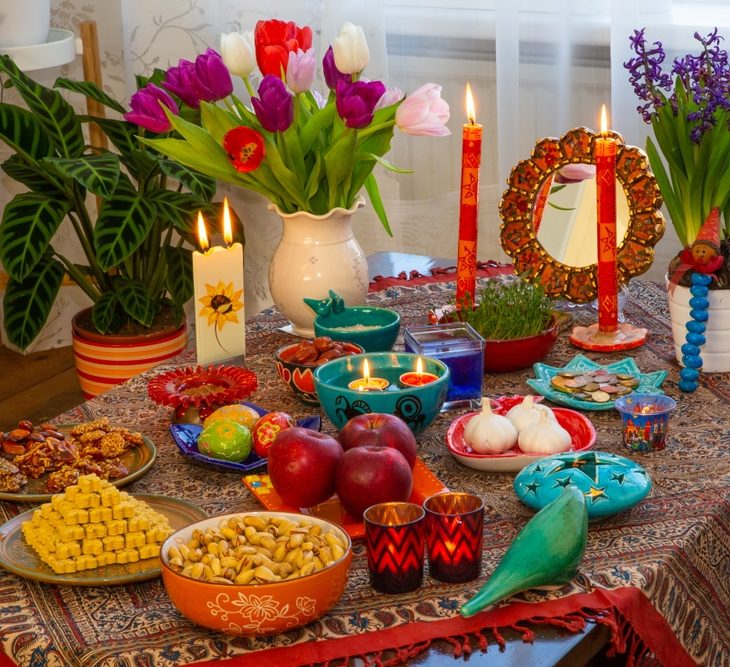North American Zoroastrians Usher In Nowruz, A New Day, On Saturday, March 20, The Official Start Of The Vernal Equinox
March 17, 2021

Following a pandemic year marred by sickness, death, and loss around the world, the occasion of Nowruz offers hope and the promise of a New Day
BURR RIDGE, Ill. — FEZANA, the Federation of Zoroastrian Associations of North America, today announced Zoroastrians throughout North America will celebrate Nowruz (pron. nouˈɾuːz or New Day in English), this Saturday, March 20, the official start of the Vernal equinox.
While Zoroastrians typically celebrate Nowruz with prayer ceremonies, community gatherings, participation in Nowruz parades, museum exhibits, tree plantings, and social gatherings, this year will be different due to the fallout of the COVID-19 pandemic and the need to socially distance, and continue holding events virtually rather than in person.
“We expect the many Zoroastrians and non-Zoroastrians who celebrate Nowruz will do so safely in the confines of their homes, decorating beautiful Haft-Seen tables1 and connecting with friends and loved ones virtually,” said FEZANA President Arzan Sam Wadia. “That said, the broader symbolism of Nowruz represents renewal, rejuvenation, and a new beginning. The world has just endured a historic and deadly pandemic, and we pay respect and honor the lives lost by responsibly turning the page to better and brighter days ahead.”
Wadia said FEZANA will mark the occasion with a first-ever Virtual Nowruz Prayer Circle and Countdown, Saturday, March 20, at 5 a.m. Eastern / 2 a.m. Pacific (North American Daylight Savings Time).
We wish our Zarathusti and non-Zarathushti brethren a very auspicious Nowruz,” said Erv. Arda-e-viraf Minocherhomjee, President, North American Mobeds Council. “We celebrate and pray for the triumph of truth and righteousness over evil tendencies, and encourage everyone, from our Mobeds/priests to congregants, to get vaccinated and worship safely as we begin anew.”
On the occasion of Nowruz 2021, both FEZANA and the North American Mobed’s Council, as the two organizations did last October, are promoting guidance issued by the Centers for Disease Control (CDC) through its guidelines or Considerations for Communities of Faith: https://www.cdc.gov/coronavirus/2019-ncov/community/faith-based.html
“We are thrilled to see vaccination rollouts around the world, but encourage folks to stay the course in maintaining responsible social distancing, wearing a mask and washing their hands,” Wadia said. “We are simply not out of the woods as new variant strains permeate, and inoculation efforts to achieve herd immunity remain a gradual and ongoing process, particularly for underserved communities and developing nations.”
Zoroastrians are followers of one of the world’s oldest monotheistic religions founded by the prophet Zarathushtra more than 3,000 years ago in ancient Iran. Zoroastrians have long served as bridge builders in interfaith dialogue, believing in truth, righteousness, charity, beneficence, respect and care for the environment, and the ultimate triumph of good over evil.
Zoroastrianism flourished as the imperial religion of three Persian empires, those of the Achaemenians, Parthians and Sassanians, and was the dominant religion from Turkey and eastward to China during those times. North America’s Zoroastrian community includes those who arrived from the Indian subcontinent, known as Parsis and those who came directly from Iran seeking religious freedom.
About FEZANA
Founded in 1987, the Federation of Zoroastrian Associations of North America (FEZANA) represents a diverse and growing Zarathushti community in the western diaspora. Guided by the blessings of Ahura Mazda and the teachings of prophet Zarathushtra, the non-profit federation serves as the coordinating body for 27 Zoroastrian associations and 14 corresponding groups in Canada and the United States. The activities of FEZANA are conducted in a spirit of mutual respect, cooperation, and unity among all member associations, and with due regard for the Zarathushti principles of goodness, truth, reason, benevolence, implicit trust and charity toward all mankind. Visit www.fezana.org and follow FEZANA on Instagram, Twitter, and Facebook @TheFEZANA.
###
1 Note to editors: for more information on Haft Seen tables please visit: https://www.youtube.com/watch?v=HZnoNXrkfO0
Contact:
Jim Engineer
FEZANA
6307281387
[email protected]
Disclaimer: The views and opinions expressed in this article are those of the authors and do not necessarily reflect the official policy or position of the Religion News Service or Religion News Foundation.
Share
Related Articles
American Civic Life
We Commemorate, We Commit: Out of Catastrophe, a Conversation on Connection and Repair
American Civic Life
Faith Based Efforts Work in Vaccine Uptake: Now Let’s Make it Easy
American Civic Life



